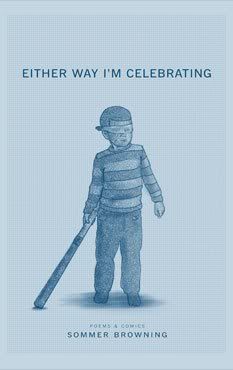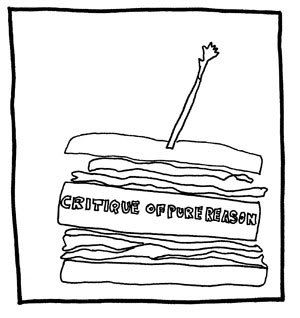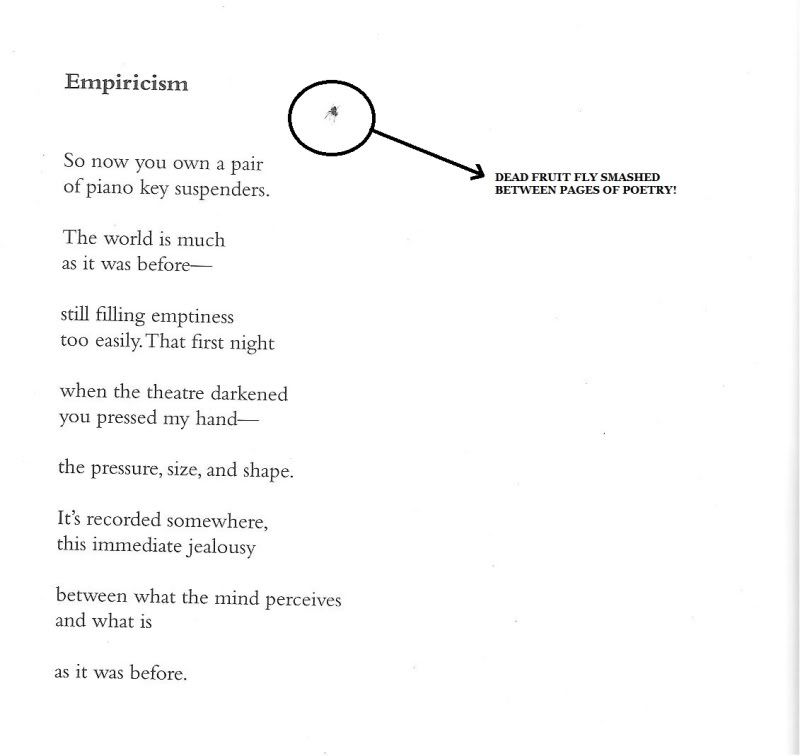
"It's always strange to be born / before the cusp of some new age, / hanging onto nothing" (22), writes Sommer Browning in her book Either Way I'm Celebrating (Birds, LLC 2011). In some ways, I think this sums up the experience of reading this collection, at least to the extent that it's strange to be on the cusp of "the new," especially if you're predisposed to hang onto genre distinctions. By this, I mean that Browning's collection oscillates between comics, poems, flash fiction, and oblique notes to a housesitter. Given the alterations, its changes could be disconcerting if you're looking for familiarity; but if the prospect of variety sounds exciting to you, then Either Way I'm Celebrating makes for a fantastic read.
The opening series of poems works best when the speaker incorporates phrases that read like one-liners (as in jokes, not as in lines of poetry). Some of my favorite moments include: "I'm worried how many more times I'll tell the story / about peeing in a cop car before someone loves me" (18), "I collect books found in celebrities' bathrooms; so far / my life sucks" (19), and "um...you're going to make me say it? Your taint. Is it your taint?" (32). What all these excerpts have in common, I think, is a particular irreverence (at least in relation to most poetry) and a casual tone that makes the speaker sound both identifiable and believable. This characteristic is important because, when the speaker delivers her more grandiose statements such as "Sometimes, it's the world that's inadequate" (18) and "There is too, a galaxy in poetry" (19), we're willing to accept them from a voice we've come to trust.
In the second section of writing, we told a tale about a couple staying in a hotel to watch a UFC fight and visit a historical Whitman site. With its catalogs of the contemporary American landscape and consumerism, it reads like an update not just of Whitman, but also of Ashbery and Brainard's The Vermont Notebook (which itself was a Whitman re-write).
The final text portion of the book is titled "To the Housesitter," which, as previously mentioned, are a series of notes to someone who will be taking care of (you guessed it) a house. The notes create an ever strange and mutating house that "is as malleable as vocabulary" (86) by offering us both prose and verse, which turns the commonplace into linguistic novelties, such as a "dribbling refrigerator...shaped like mouths" (67).
Of course, the most prominent aspect of the Either Way I'm Celebrating are the comics; by turns witty and absurd, they provide visual respites before and after each section of text. My favorite (as well as indicative of the tone and aesthetic of the comics collectively) is the "Critique of Pure Reason":

I can't tell you exactly why someone stuffed a copy of Kant's Critique of Pure Reason into the middle of a sandwich, but what does that matter? The seemingly random gesture undercuts the inherent seriousness (some may say pretentiousness) of philosophy and those who choose to engage such subject matter. And it should also be pointed out that the black and white drawings, at least aesthetically, once again echo The Vermont Notebook and Brainard's charcoal drawings therein.

I can't tell you exactly why someone stuffed a copy of Kant's Critique of Pure Reason into the middle of a sandwich, but what does that matter? The seemingly random gesture undercuts the inherent seriousness (some may say pretentiousness) of philosophy and those who choose to engage such subject matter. And it should also be pointed out that the black and white drawings, at least aesthetically, once again echo The Vermont Notebook and Brainard's charcoal drawings therein.
Finally, in the spirit of the collection, I'd like to share an experience I had when reading the poem "Empiricism" (Click image for detailed view):



Can I borrow this?
ReplyDeleteTrue, true. I think that irreverence or some similar aspect of tone, voice, etc. contextualizes larger pronouncements in that certain way you mention.
ReplyDeleteHowever, on a larger scale, have you thought about adding a gimmick to the reviews? How many "thumbs up" are you giving the book? Or better yet, how many black turtlenecks did it receive?
And I wouldn't let this other guy borrow the book. Just my opinion.
Hi Bret
ReplyDelete